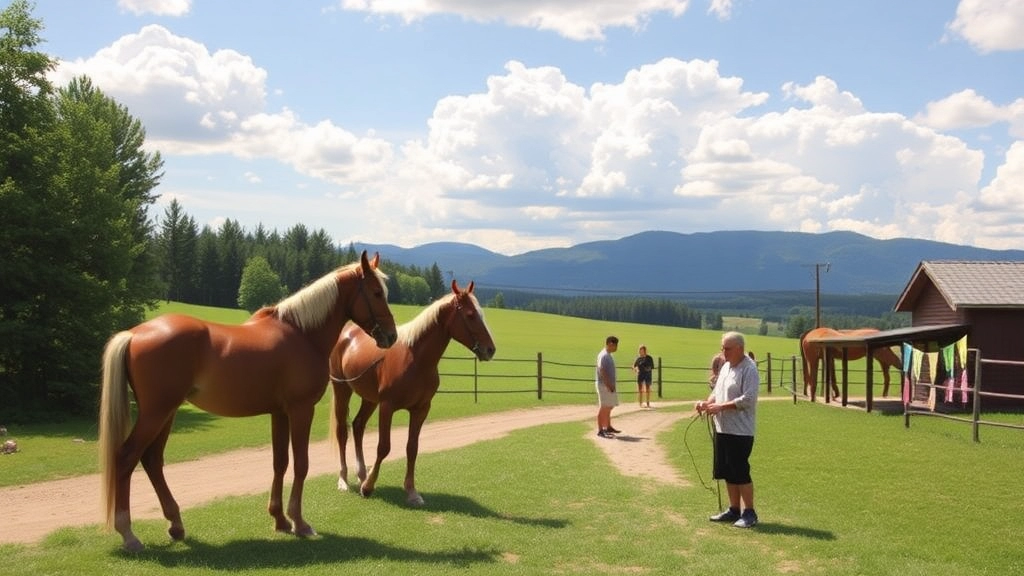Welcome to the Ultimate Guide on Summer Horse Camps!
Whether you’re a parent looking to give your child an unforgettable summer experience or a rider eager to hone your skills, this article covers everything you need to know. From the different types of camps available to the essential skills taught, and even what to pack, we’ve got you covered. Dive in to discover the perfect summer horse camp that matches your needs and interests.
What to Expect
We’ll explore the nuances between Western and English riding lessons, delve into the non-riding activities that make these camps a holistic experience, and emphasize the importance of safety measures and certified instruction. Additionally, we’ll guide you on selecting the right camp based on age and experience, and weigh the pros and cons of day versus overnight camps.
Conclusion
By the end of this article, you’ll be well-equipped to make an informed decision and ensure a summer filled with adventure, learning, and fun at a top horse camp in the U.S.
Types of Summer Horse Camps
Alright, let’s dive straight into it. You’re probably wondering, “What types of summer horse camps are out there?” Well, let me break it down for you. There are several types of horse camps, each catering to different needs, interests, and skill levels. Whether you’re a complete newbie or a seasoned rider, there’s something for everyone.
Day Camps
Day camps are perfect for those who want to dip their toes into the world of horse riding without committing to an overnight stay. These camps typically run from morning until late afternoon, allowing kids (and sometimes adults) to return home each evening. They focus on basic riding skills, horse care, and fun activities. Great for beginners and young children.
Overnight Camps
If you’re looking for a more immersive experience, overnight camps are the way to go. These camps usually last a week or more and offer a comprehensive horse riding program. Expect to learn not just riding skills but also horse grooming, feeding, and stable management. Ideal for those wanting a deep dive into horse life.
Specialized Camps
Specialized camps focus on a particular riding style or discipline. Whether it’s dressage, show jumping, or Western riding, these camps offer intensive training in a specific area. Best suited for intermediate to advanced riders.
Therapeutic Riding Camps
These camps are designed for individuals with special needs. They offer therapeutic riding sessions that can help improve physical and emotional well-being. A fantastic option for those needing a bit more support.
Family Camps
Why not make it a family affair? Family camps allow parents and children to experience the joys of horse riding together. These camps offer activities for all ages and skill levels, making it a perfect bonding experience. Great for family vacations.
Adventure Camps
For the thrill-seekers out there, adventure camps combine horse riding with other outdoor activities like hiking, canoeing, and even rock climbing. These camps are all about making the most of the great outdoors. Perfect for those who love a bit of everything.
If you’re interested in other exciting summer camp options, check out the Cranbrook Summer Camp for a variety of activities for different age groups. For those looking for a unique experience, the Avengers Summer Camp offers superhero-themed fun and learning opportunities.
Horseback Riding Lessons: Western vs. English
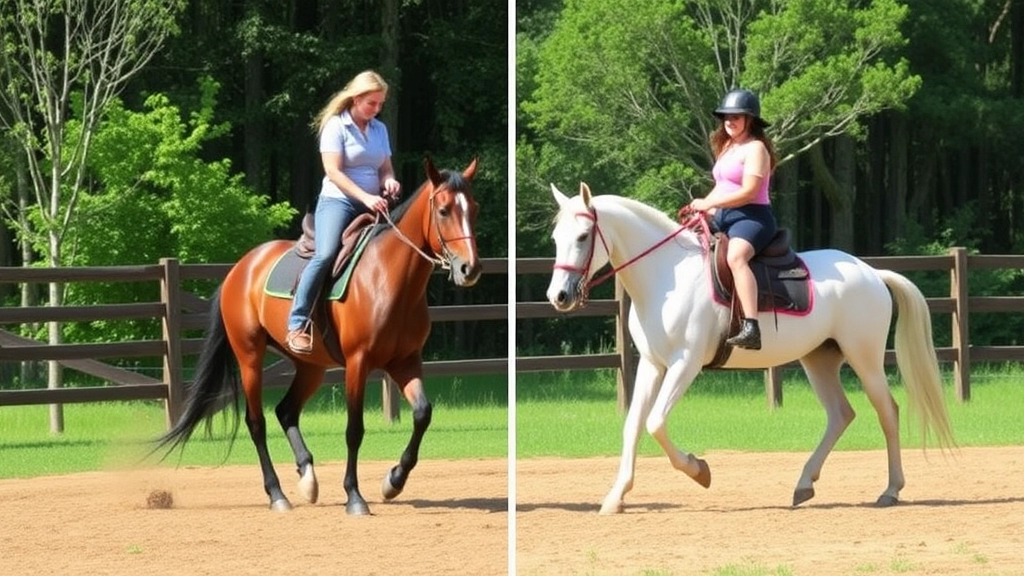
Ever wondered if you should go for Western or English riding lessons at a summer horse camp?
You’re not alone.
Choosing between these two styles can be a bit of a head-scratcher.
So, let’s break it down and make it easy.
Western Riding: The Cowboy Way
Western riding is what you see in cowboy movies.
It’s all about comfort and practicality.
Here’s what makes it unique:
- Saddle: Bigger and heavier, with a horn for roping cattle.
- Riding Style: More relaxed, with one hand on the reins.
- Activities: Barrel racing, trail riding, and cattle herding.
Why choose Western?
- Comfort: The saddle is comfy for long rides.
- Versatility: Great for beginners and those interested in ranch activities.
- Stability: Easier for kids to balance and feel secure.
English Riding: The Elegant Choice
English riding is the style you see in the Olympics.
Think elegance and precision.
Here’s what sets it apart:
- Saddle: Smaller and lighter, no horn.
- Riding Style: More formal, with both hands on the reins.
- Activities: Dressage, show jumping, and eventing.
Why go for English?
- Precision: Ideal for those who love discipline and technique.
- Competitive Edge: Opens doors to competitive riding.
- Posture: Helps improve balance and posture.
So, Which One’s for You?
Still torn between Western and English?
Here’s a quick rundown to help you decide:
- For Relaxed Rides: Go Western.
- For Competitive Spirit: Choose English.
- For Beginners: Western is usually easier to start with.
- For Advanced Riders: English offers more technical challenges.
Real Stories from Camp
I remember my first time at a summer horse camp.
I was all geared up for Western riding because, let’s face it, who doesn’t want to feel like a cowboy?
But then I tried English riding, and it was a game-changer.
The discipline and technique really hooked me.
So, it’s okay to try both and see what clicks for you.
Making the Choice
Whether you go Western or English, the key is to enjoy the ride.
Both styles have their own charm and benefits.
And guess what?
Many camps offer both options, so you can switch it up and get the best of both worlds.
Ready to saddle up?
Choose your style and get riding.
Your summer horse camp adventure awaits!
Looking for more tips on horse camps? Check out our section on Key Skills Taught at Horse Camps for a deeper dive into what you’ll learn. And don’t forget to read about Safety Measures and Certified Instruction to ensure you’re in good hands.
Happy riding!
Key Skills Taught at Horse Camps
Ever wondered what skills you or your kids might pick up at a summer horse camp? You’re not alone. Let’s dive into what makes these camps a fantastic learning ground.
Riding Skills
First off, it’s all about getting comfortable in the saddle. Camps teach both Western and English riding styles. You’ll get the hang of:
- Mounting and Dismounting: Sounds basic, but it’s crucial.
- Balance and Posture: Keeping centred is key.
- Control and Steering: Learn to guide your horse with confidence.
Horse Care Basics
Caring for a horse is just as important as riding. Expect to learn:
- Grooming Techniques: Brushing, cleaning hooves, and more.
- Feeding and Nutrition: What your horse needs to stay healthy.
- Tack and Equipment: How to properly fit and maintain gear.
Safety Skills
Safety is non-negotiable. Camps focus on:
- Helmet Safety: Proper fit and why it matters.
- Emergency Dismounts: What to do if things go south.
- Reading Horse Behaviour: Understanding moods and signals.
Teamwork and Communication
Horses teach us more than just riding:
- Building Trust: Forming a bond with your horse.
- Working with Others: Group activities require teamwork.
- Problem-Solving: Handling unexpected situations.
Real Stories and Examples
Imagine this: A shy kid arrives at camp, unsure and a bit scared. By the end of the week, they’re confidently leading a horse through an obstacle course. That’s the kind of transformation we’re talking about.
Why These Skills Matter
These skills aren’t just for horse lovers. They build confidence, responsibility, and leadershipâqualities that stick with you long after camp ends.
So, if you’re looking to boost your riding skills or just want to learn something new, a summer horse camp might be just what you need. Whether it’s mastering the Western riding style or learning how to read horse behaviour, these camps offer invaluable experiences.
For more information on choosing the best camp, check out our Ultimate Guide to Kids’ Summer Camps.
Non-Riding Activities at Horse Camps
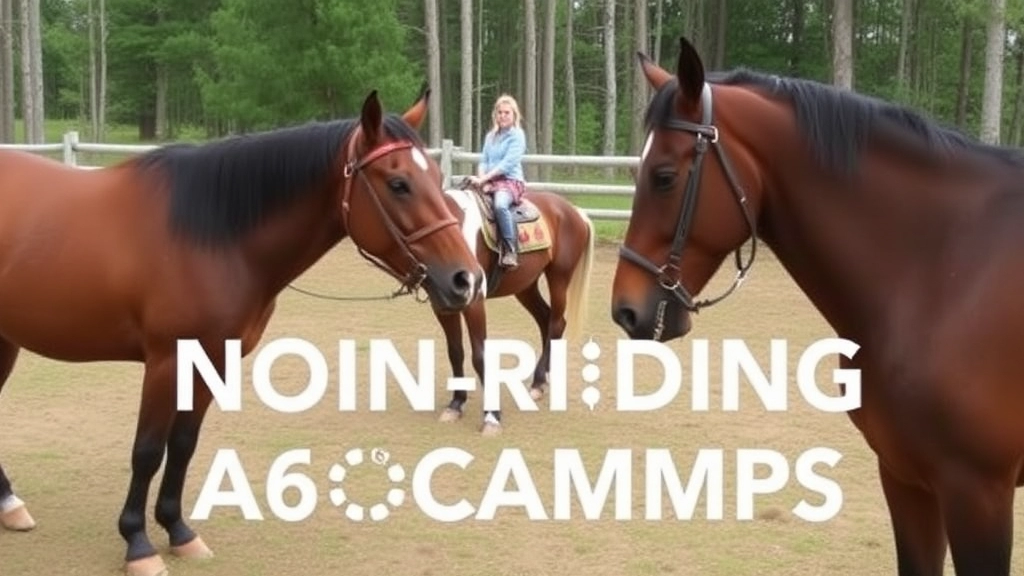
Ever wondered what else you’ll do at a horse camp besides riding? You’re not alone. Many parents and campers ask this all the time. Let’s dive into the non-riding activities that make horse camps a blast.
Hands-On Horse Care
Taking care of a horse is a big job. At camp, you’ll learn all about grooming, feeding, and even mucking out stalls. It’s not just about riding; it’s about bonding with your horse. You’ll get to:
- Groom daily: Brushing, cleaning hooves, and maintaining tack.
- Feed and water: Understanding dietary needs and schedules.
- Muck out stalls: Keeping the living spaces clean and comfortable.
Arts and Crafts
Yes, you read that right. Horse camps often have arts and crafts sessions. You can create horse-themed art, make friendship bracelets, or even design your own horse gear. It’s a great way to unwind and get creative.
Nature Walks and Hiking
When you’re not in the saddle, you might be exploring the great outdoors. Nature walks and hikes are common. You’ll learn about local flora and fauna, and maybe even spot some wildlife. It’s a perfect way to appreciate the beauty of nature.
Team-Building Games
Horse camps are also about making friends. You’ll participate in team-building games that develop trust and cooperation. Think obstacle courses, scavenger hunts, and group challenges. These activities help you bond with fellow campers.
Educational Workshops
Learning doesn’t stop with horses. Many camps offer workshops on various topics:
- Horse anatomy: Understanding how your horse’s body works.
- Equine first aid: Basic skills to keep your horse healthy.
- Sustainable practices: How to care for the environment while enjoying equestrian activities.
Campfires and Storytelling
What’s a camp without a campfire? Evenings often end with everyone gathered around a fire, sharing stories and roasting marshmallows. It’s a time to relax, reflect on the day, and connect with others.
Swimming and Sports
Many horse camps have access to swimming pools or nearby lakes. Swimming is a fantastic way to cool off after a day of riding. You might also find sports like volleyball, soccer, or even yoga sessions.
Safety Measures and Certified Instruction
Alright, let’s talk about something that’s on every parent’s mind when sending their kid off to a summer horse camp: safety measures and certified instruction. You don’t want to be the parent who’s constantly worrying about whether your child is safe, right? So, let’s dive into what these camps do to keep everyone safe and sound.
Why Safety Measures Matter
First off, horses are big animals. They’re beautiful, majestic, and can be the best friends your kids ever have, but they can also be unpredictable. So, how do camps ensure your child is safe?
- Helmets: This is non-negotiable. Every rider, no matter their skill level, should wear a helmet. Camps that don’t enforce this are a big red flag.
- Proper Footwear: No flip-flops here. Sturdy boots with a heel are a must to prevent feet from slipping through stirrups.
- Supervised Riding: Kids should never be left alone with horses. Certified instructors need to be present at all times.
Certified Instruction: What to Look For
Now, let’s talk about the folks who are actually teaching your kids. You want to make sure they’re not just enthusiasts but certified professionals. Here’s what to check:
- Certification Bodies: Look for instructors certified by reputable organisations like the British Horse Society (BHS) or the American Riding Instructors Association (ARIA).
- First Aid Training: Instructors should have up-to-date first aid training. Accidents happen, and you want someone who knows how to handle them.
- Experience: It’s not just about having a certificate. Experience matters. How long have they been teaching? Do they have good reviews?
Real-Life Example
I remember visiting a camp where the instructor had over 20 years of experience and was certified by BHS. The way she handled the horses and taught the kids was nothing short of impressive. She had a knack for making sure everyone felt safe and confident. That’s the kind of expertise you want for your child.
Safety Drills and Protocols
Most top-notch camps will have safety drills and protocols in place. Here’s a quick list of what to expect:
- Emergency Drills: Regular drills for what to do in case of an emergency.
- Safety Briefings: Daily briefings on safety rules and what to do in different scenarios.
- Buddy System: Kids are paired up so they can look out for each other.
For more information on how to ensure a safe and enjoyable summer camp experience, check out our Ultimate Packing Checklist and learn about Summer Camp Insurance Coverage.
Selecting the Right Camp Based on Age and Experience
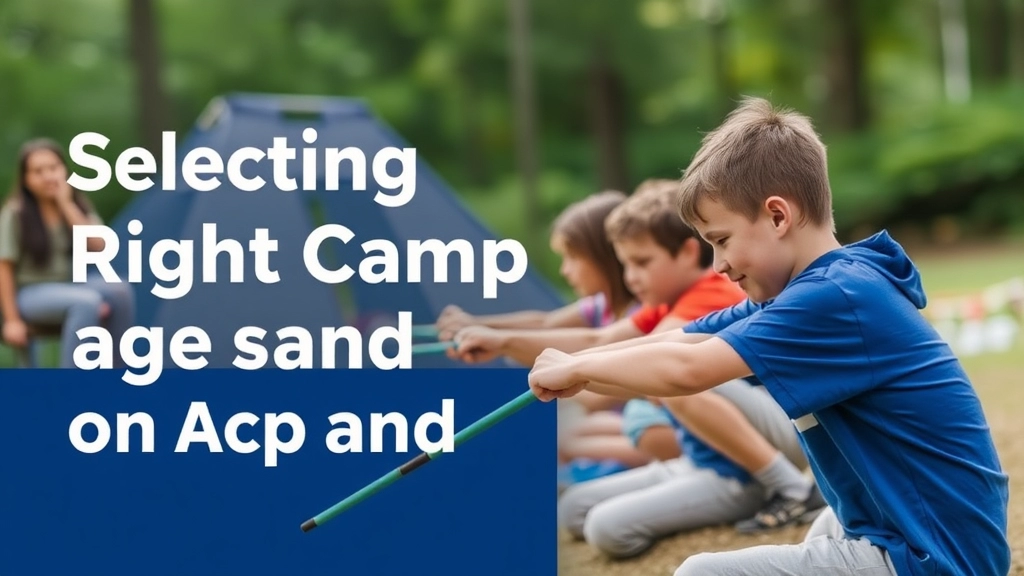
Ever wonder if your kid’s ready for a summer horse camp? Or maybe you’re thinking about going yourself?
Let’s break it down.
Why Age and Experience Matter
Picking the right camp isn’t just about fun. It’s about safety and growth. You want a camp that matches your skill level and age group.
For the Little Ones (Ages 5-7)
- Look for camps with pony rides and basic horse care.
- Focus on camps that offer shorter sessions to keep their attention.
- Safety and gentle horses are key.
For the Tweens (Ages 8-12)
- Camps should offer a mix of riding styles—maybe a bit of Western and English.
- They should start learning about horse grooming and basic tack.
- Look for camps that offer beginner to intermediate lessons.
For Teens and Adults
- Advanced camps should focus on jumping, dressage, or trail riding.
- Look for specialized camps that match your riding discipline.
- Consider camps that offer leadership opportunities or horsemanship clinics.
Experience Level
- Beginners: Focus on camps that teach the basics—saddling, mounting, and basic riding skills.
- Intermediate Riders: Look for camps that introduce more complex skills like cantering and small jumps.
- Advanced Riders: Seek out camps that offer competitive training or specialized disciplines.
How to Choose
- Read Reviews: Check out what others say about the camp.
- Visit the Camp: If possible, take a tour before committing.
- Ask Questions: What’s the instructor-to-student ratio? Are the instructors certified?
Real-Life Example
I remember a friend who picked a camp just because it was close by. Her daughter was a beginner but ended up in a group with advanced riders. She felt overwhelmed and didn’t enjoy it.
Lesson learned? Match the camp to the rider’s experience.
Choosing the right summer horse camp based on age and experience isn’t just a checklist—it’s about finding the perfect fit for growth and fun.
And hey, the right camp can turn a curious kid into a passionate rider.
Keep these tips in mind, and you’ll find the perfect camp that aligns with your needs and skill level.
What to Pack for a Summer Horse Camp
Alright, so you’re all set to head to a summer horse camp, but what do you actually need to pack? Let’s break it down so you don’t end up looking like you’ve brought your entire house with you. Trust me, I’ve been there.
Essential Riding Gear
First things first, let’s talk about the riding essentials. You don’t want to be caught unprepared when it’s time to saddle up.
- Riding Helmet: This is non-negotiable. Safety first, folks. Make sure it’s ASTM/SEI certified.
- Riding Boots: Go for boots with a heel to prevent your foot from slipping through the stirrup. Paddock boots or tall boots, your choice.
- Riding Pants: Breeches or jodhpurs are ideal. They’re designed to keep you comfortable and avoid chafing.
- Gloves: These might seem optional, but trust me, they’re a lifesaver for your hands.
Clothing for All Occasions
You’ll need more than just riding clothes. Here’s a quick list to keep you covered for all camp activities:
- T-Shirts and Tank Tops: Breathable and comfortable for those hot summer days.
- Long-Sleeve Shirts: For cooler evenings and to protect your arms from the sun.
- Jeans or Comfortable Trousers: For non-riding activities.
- Swimwear: Because you never know when a pool or lake might be part of the fun.
- Jacket or Sweater: Even summer nights can get chilly.
Personal Care Items
You’re going to be active and outdoorsy, so pack these essentials to stay fresh and clean:
- Sunscreen: A must-have to protect your skin from harmful UV rays.
- Insect Repellent: Keep the bugs at bay.
- Toiletries: Toothbrush, toothpaste, shampoo, soap, etc. You know the drill.
- Medications: Any personal meds you need. Don’t forget a basic first-aid kit.
Miscellaneous Must-Haves
These items might not fit neatly into a category, but they’re equally important:
- Water Bottle: Staying hydrated is crucial.
- Notebook and Pen: For jotting down tips, notes, or even keeping a camp diary.
- Camera or Phone with Charger: Capture those memorable moments.
- Snacks: Because camp food doesn’t always hit the spot. Check out these healthy summer camp snacks kids love.
Stories from the Saddle
I remember my first horse camp. I showed up with a suitcase full of clothes but forgot my riding gloves. By day two, my hands were blistered and sore. Lesson learned: pack smart, not just heavy.
Final Thoughts
Packing for a summer horse camp doesn’t have to be stressful. With this checklist, you’ll be prepared for anything camp life throws at you. Remember, the keyword here is prepared. The more you think ahead, the smoother your camp experience will be. For more tips on summer camps, check out our top summer camp games and activities guide.
Day vs. Overnight Horse Camps: What to Expect
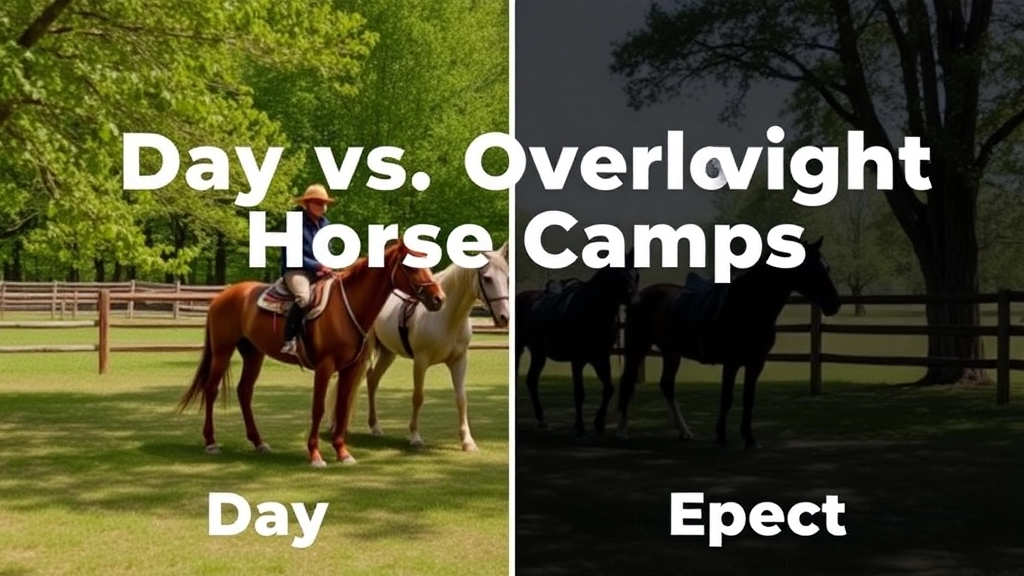
Day vs. Overnight Horse Camps – it’s a choice that can make or break your summer.
So, what’s the deal?
Day Camps:
- Perfect for Beginners: If you’re new to the horse world, day camps are a great start. You get to dip your toes in without the commitment of an overnight stay.
- Home Comforts: You get to go home each night. This is a win if you’re not ready to be away from your bed or family.
- Structured Schedule: Typically, day camps run from morning until late afternoon. Expect a mix of riding lessons, horse care, and fun activities.
- Cost-Effective: Generally, day camps are cheaper. You’re not paying for lodging and meals, which can add up.
Overnight Camps:
- Immersive Experience: You eat, sleep, and breathe horses. It’s like living in a horsey dream.
- Bonding Time: You’ll make friends for life. Sharing a cabin, late-night chats, and campfires create memories that stick.
- More Riding Time: More hours in the day mean more time in the saddle. You’ll progress faster.
- Independence: Being away from home helps build confidence and self-reliance. It’s a growth experience, not just for your riding skills but for life.
What to Expect at Both:
- Safety First: Both types of camps focus on safety. Helmets, proper gear, and supervised activities are non-negotiable.
- Certified Instructors: Look for camps with certified instructors. This ensures you’re getting top-notch training.
- Non-Riding Activities: Expect a mix of activities. Think arts and crafts, swimming, and team-building games. It’s not just about horses.
Choosing the Right Fit:
- Age and Experience: Younger kids or beginners might feel more comfortable with day camps. Older or more experienced riders can benefit from the immersive nature of overnight camps.
- Personal Preference: Some people thrive in social settings, while others prefer the comfort of home. Know yourself or your child before making a decision.
Packing Tips:
- Day Camps: Pack light. Essentials like a helmet, riding boots, water bottle, and snacks should do.
- Overnight Camps: You’ll need more. Think clothes for all weather, toiletries, bedding, and personal items. Don’t forget your riding gear!
Benefits of Attending a Summer Horse Camp
Why should you even consider sending your kid to a summer horse camp?
I get it, you’re probably wondering if it’s worth the time, money, and effort. Let’s break it down.
Real-Life Skills Beyond Riding
First off, summer horse camps are not just about riding horses. Yes, that’s a big part, but the benefits go way beyond that. Here’s what your child can gain:
- Responsibility: Caring for a horse teaches kids about responsibility. They learn to feed, groom, and even muck out stalls. It’s a hands-on lesson in taking care of another living being.
- Teamwork: Many activities at horse camps require kids to work together. Whether it’s helping each other tack up or participating in group activities, teamwork is a key takeaway.
- Confidence: Mastering riding skills and successfully handling a horse can be a huge confidence booster. Kids learn to trust themselves and their abilities.
Physical and Mental Health Benefits
Physical exercise is a no-brainer. Riding a horse is a full-body workout. It improves balance, coordination, and muscle strength. But there’s more:
- Mental Health: Being around animals has been shown to reduce stress and anxiety. The bond kids form with their horses can be incredibly therapeutic.
- Outdoor Time: In an age where screens dominate, getting kids outside is crucial. Fresh air and nature do wonders for the soul.
Social Skills and Friendships
Let’s not forget the social aspect. Horse camps are a great place for kids to make new friends. They’ll meet others who share their interests, and these friendships often last a lifetime. Plus, they learn essential social skills like communication and empathy.
Educational Opportunities
Learning doesn’t stop when school’s out. Many horse camps offer educational programs about horse anatomy, veterinary care, and even the history of horseback riding. It’s a fun way to keep the brain engaged during the summer months.
Fun and Adventure
Last but not least, it’s just plain fun. Riding through trails, participating in campfire nights, and engaging in various camp activities make for an unforgettable summer. It’s an adventure that kids will talk about for years.
Why Choose a Summer Horse Camp?
If you’re still on the fence, think about what your child stands to gain. From life skills and physical health to social interactions and pure fun, the benefits are compelling. Plus, it’s a great way to break the monotony of the usual summer routine. For more options, you might want to check out the Equestrian Summer Camps or explore the Farm Summer Camp for a broader experience.
Top Horse Camps in the U.S.
Ever wondered where you can find the best horse camps in the U.S.?
You’re in the right place.
Finding the perfect camp can be a game-changer for your summer.
Let’s dive into some of the top horse camps that have been making waves.
Rockbrook Camp for Girls (North Carolina)
This camp is a dream.
Nestled in the Blue Ridge Mountains, Rockbrook offers a blend of horseback riding and traditional camp activities.
- Highlights:
- Riding lessons for all levels
- Trail rides through stunning landscapes
- Certified instructors ensuring top-notch safety
Raquette Lake Camps (New York)
Looking for a co-ed experience?
Raquette Lake Camps has been around for over 100 years, and they know their stuff.
- Highlights:
- Both English and Western riding styles
- State-of-the-art facilities
- A mix of riding and non-riding activities
Camp Illahee (North Carolina)
Another gem in North Carolina.
Camp Illahee is all about creating lifelong memories with horses.
- Highlights:
- Small group sizes for personalised attention
- Focus on building riding skills and confidence
- Beautiful, serene setting
Cheley Colorado Camps (Colorado)
If you’re after a high-altitude adventure, Cheley Colorado Camps is the place.
Set in the Rocky Mountains, this camp offers a unique riding experience.
- Highlights:
- Extensive trail riding opportunities
- Emphasis on horsemanship and outdoor skills
- Experienced staff with a passion for horses
Camp Kippewa for Girls (Maine)
Maine’s natural beauty makes Camp Kippewa a standout.
This all-girls camp is perfect for those looking to combine riding with other fun activities.
- Highlights:
- Tailored riding programmes for different skill levels
- A variety of camp activities beyond riding
- Supportive and encouraging environment
Catalina Island Camps (California)
Want a camp with a view?
Catalina Island Camps offers horseback riding with a coastal twist.
- Highlights:
- Riding along the scenic trails of Catalina Island
- Campers learn about horse care and riding techniques
- A unique blend of beach and horse camp experiences
Camp Ton-A-Wandah (North Carolina)
North Carolina strikes again with Camp Ton-A-Wandah.
This camp prides itself on its strong riding programme.
- Highlights:
- Comprehensive riding lessons
- Beautiful riding trails
- Focus on building strong rider-horse relationships
Hidden Valley Camp (Maine)
Hidden Valley Camp is another top pick in Maine.
It’s known for its warm community and excellent riding programme.
- Highlights:
- Riding lessons tailored to individual needs
- A supportive and inclusive camp culture
- Beautiful natural surroundings
Mountain Top Summer Camp (Georgia)
Down in Georgia, Mountain Top Summer Camp offers an unforgettable experience.
- Highlights:
- Diverse riding programmes
- Focus on both riding and general camp fun
- Experienced and passionate staff
Camp Wicosuta (New Hampshire)
Last but not least, Camp Wicosuta in New Hampshire.
This all-girls camp offers a balanced mix of riding and other activities.
- Highlights:
- Riding lessons for all skill levels
- A variety of camp activities to explore
- A nurturing and fun environment
Looking for more summer camp options? Check out our ultimate guide to boys and girls summer camps and budget tips for summer camp costs.
Happy riding!
FAQs for Summer Horse Camp
What are the main differences between Western and English riding styles?
Western riding is known for its comfort and practicality, often seen in cowboy movies. It features a bigger, heavier saddle with a horn and a more relaxed riding style. English riding, on the other hand, is more formal and precise, often seen in Olympic events. It uses a smaller, lighter saddle and requires both hands on the reins.
Which riding style is better for beginners?
Western riding is generally easier for beginners due to its comfortable saddle and more relaxed style. It provides better stability, which is ideal for those new to horseback riding.
Can I try both Western and English riding at the same camp?
Yes, many summer horse camps offer both Western and English riding lessons, allowing you to experience both styles and decide which one you prefer.
What non-riding activities can I expect at a horse camp?
Horse camps offer a variety of non-riding activities such as hands-on horse care, arts and crafts, nature walks and hiking, team-building games, educational workshops, and campfires and storytelling. Some camps also provide access to swimming pools or lakes and offer sports like volleyball and soccer.
How do I choose the right camp based on age and experience?
It’s essential to select a camp that matches your age and experience level. Camps for younger children (ages 5-7) often focus on pony rides and basic horse care, while camps for tweens (ages 8-12) offer a mix of riding styles and beginner to intermediate lessons. Advanced camps for teens and adults may focus on specialized disciplines like jumping or dressage.
What are the benefits of day camps vs. overnight camps?
Day camps are perfect for beginners and those who prefer to return home each night. They are typically more cost-effective and offer a structured schedule. Overnight camps provide an immersive experience, more riding time, and opportunities for making lasting friendships. They also help build independence and self-reliance.
How can I ensure the camp is safe and has qualified instructors?
Look for camps that emphasize safety with proper gear and supervised activities. Ensure the instructors are certified and check reviews or visit the camp beforehand if possible. Asking questions about the instructor-to-student ratio and the camp’s safety measures can also provide peace of mind.
What should I pack for a day camp vs. an overnight camp?
For day camps, pack essentials like a helmet, riding boots, a water bottle, and snacks. For overnight camps, you’ll need more items such as clothes for all weather, toiletries, bedding, personal items, and your riding gear.
References
-
Understanding Different Horseback Riding Styles
-
Choosing the Right Horse Camp for Your Child
-
Essential Tips for Horseback Riding Beginners

